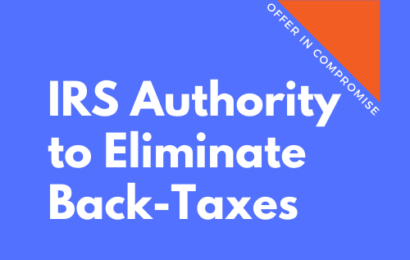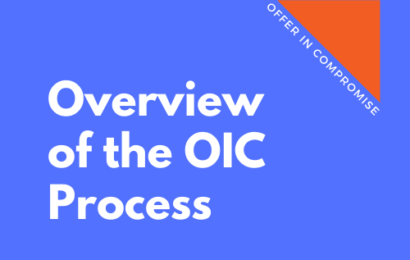
- Instructor: Attorney Bob Schaller
- Lectures: 9
- Quizzes: 1
Is the OIC Offer Submitted “Processable?” – Part 2.
The IRS receives the taxpayer’s offer. The first step it takes is to determine if the submitted offer is “processable.” This issue is divided into two separate courses. Part 1 addresses issue relating to the taxpayer’s ability to fully pay the tax liability, Tax Code compliance, failure to tender payments. Part 2 addresses issues relating to U.S. Department of Justice referrals, unassessed tax liability, competing offers, scams, and trust fund liabilities.
An Offer in Compromise must be made in writing and submitted to the IRS; an oral offer is not permitted. Boulez v. C.I.R., 810 F.2d 209 (D.C. Cir. 1987). The Offer in Compromise process based on doubt as to collectibility is initiated by a taxpayer submitting to the IRS four items: (a) a Form 656, Offer in Compromise request to compromise the back tax liability; and/or (b) a Form 433-A (OIC), Collection Information Statement for Wage Earners and Self-Employed Individuals or a Form 433-B (OIC), Collection Information Statement for Businesses; (c) payment of a $205 application fee, unless waived; and (d) payment of either a Lump-Sum Payment Offer payment or a Periodic Payment Offer payment, unless waived. Rev. Proc. 2003-71, § 4.
An offer to compromise a tax liability should be mailed to the appropriate address listed on Form 656. Rev. Proc. 2003-71, § 4.04; Cummings v. USA, No. 4:15-cv-00123-TWP-DML, pg. 15 (S.D. In. 3/19/17) (offer deemed unprocessable, in part, because offer was submitted through the Taxpayer Assistance Service). An Offer in Compromise should be filed with the district director or service center director. 26 C.F.R. §601.203(b). But field collection officers, if assigned, may want all filings and payments made through the field collection officer.





